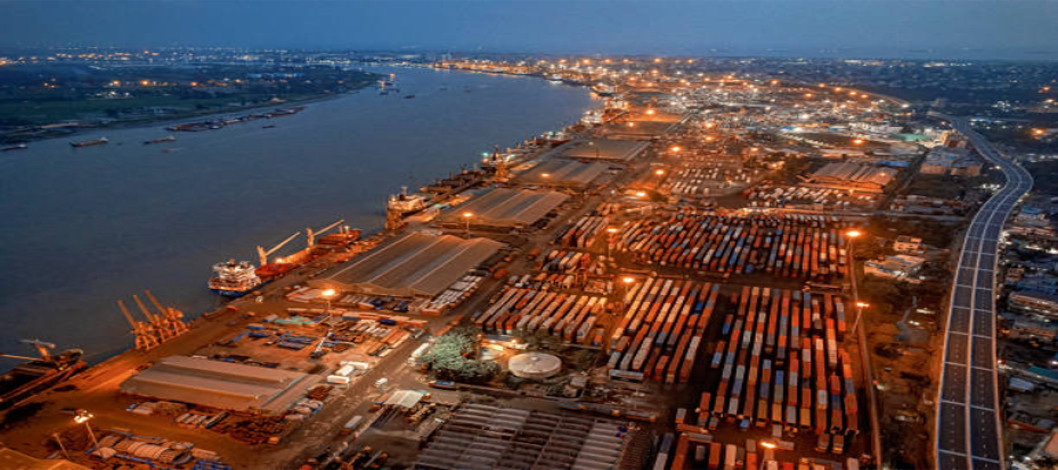
File photo
The Chittagong Port Authority (CPA) has revised its tariffs for the first time in nearly four decades, increasing port service charges by 41 percent. The tariff hike was announced in a gazette published on Sunday night and came into effect yesterday.
Business leaders fear that the decision will increase the cost of foreign trade and reduce competitiveness, especially at a time when Bangladesh is preparing to graduate from the Least Developed Country (LDC) list in November next year and will lose preferential market privileges in various countries.
The increase comes shortly after the increase in tariffs for private inland container depots (ICDs). Starting this month, ICDs have started charging up to 60 percent more for export goods and empty container handling.
The Chittagong Port Authority collects fixed charges for various services from the moment a ship enters Bangladeshi waters. The authority claims that no other port in the world offers shipping services at such a low cost. The previous tariff structure is no longer in line with current costs or demand. They say that the authorities have set more realistic rates after discussions with stakeholders.
However, traders have criticized this, saying that instead of increasing the tariff all at once, it would have been less stressful if it had been implemented in stages. They also questioned the rationale for increasing the tariff without improving the port's efficiency, handling time, and reducing congestion.
There are many tasks at Chittagong Port, such as bringing a ship to the jetty, using tugboats, supplying water, lifting and lowering containers with cranes, and delivering goods. The CPA charges a fee for each of these tasks, and the total fees for the port are determined by adding all these fees.
This is the first time since 1986 that the CPA has increased its charges in a big way. Earlier, in 2007-08, they had increased the fees for some specific services (such as tugboats, water supply, jetty rental).
New rates
According to the Gazette, the cost of container transportation has increased the most. The average cost of a 20-foot container has increased from Tk 11,849 to Tk 16,243. That is, Tk 4,395 more per container. The cost of import containers has increased by Tk 5,720, and that of export containers by Tk 3,045.
The largest increase has been in the case of loading and unloading containers from ships. It has increased from $43.40 (about Tk 5,282) to $68. That is, an increase of about Tk 3,000. Since the tariff is fixed in US dollars, the cost may increase further if the value of the dollar increases.
The cost per kg of container-based goods has increased from Tk 1.28 to Tk 1.75, which is an increase of about 37 percent. About 60 percent of the imported goods at Chittagong Port are handled at the outer anchorage. In this case, the cost will increase relatively less because they are not loaded and unloaded at the port's jetty.
Traders' concerns
Bangladesh Chamber of Industries President Anwar-ul-Alam Parvez said the increase in charges has put an additional burden on businesses. He said the new tariff structure will increase the cost of doing business and increase the production costs of domestic manufacturers.
At the same time, exporters will lose competitiveness compared to their rivals in the global market, he told The Daily Star. He said such decisions are putting additional pressure on traders on the eve of the transition from LDC.
"This sudden increase in tariffs is unreasonable on top of the delays in releasing goods due to inefficient port management."
Nasir Uddin Chowdhury, former first vice-president of BGMEA, said they had requested the government to postpone the decision to increase tariffs for a year, but it was not accepted. He alleged that the government was basically trying to hand over most of the jetties to foreign operators.
"This tariff increase has been done to benefit foreign operators," he said.
CPA Secretary Omar Faruk said that despite the request of traders, it was not possible to suspend the additional tariff. However, he said, the tariff of Chittagong port is still much lower than that of neighboring countries. The government has probably taken this into consideration.
The Finance Ministry approved the tariff increase on July 24. Following objections to this, a meeting was held at the Shipping Ministry on August 25. The meeting was chaired by Shipping Advisor Brigadier General (retd) M Sakhawat Hossain. There, traders again proposed to increase it in stages.
At the meeting, CPA Deputy Chief Finance and Accounts Officer Kazi Meraj Uddin Arif argued in favor of the tariff increase, saying that despite this increase, the tariff is still low compared to other major global ports.
BGMEA President Mahmud Hasan Khan called the increase unacceptable.
Bangladesh Shipping Agents Association Chairman Syed M Arif also opposed this, saying that additional duties on ports, berth operators, and private off-docks will increase the overall cost of trade. He warned that foreign shipping lines will also have no option but to increase freight charges, which will harm the country's foreign trade.
Source: Online/GFMM
Comment Now